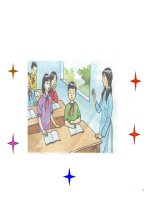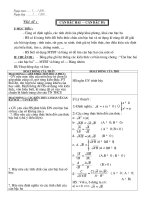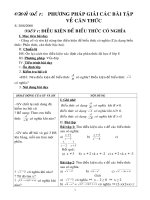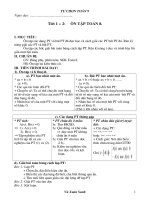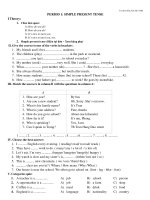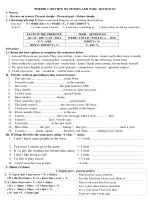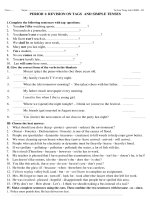Tu chon 9Tu chon AV 9 HKI.
Bạn đang xem bản rút gọn của tài liệu. Xem và tải ngay bản đầy đủ của tài liệu tại đây (1.06 MB, 9 trang )
PERIOD 1: REVIEW ON TENSES AND WISH - SENTENCES
A Theory:
1. Review on tenses: Present simple - Present past - Future simple
2. Câu mong ước loại 2: Diễn tả một hành động hay sự việc không thật ở hiện tại.
Cấu trúc: S + WISH (ES) + S + WERE / V
2
, V–ED / DIDN’T V
1
Ví dụ:2 1. I wish I were a doctor. 2. I wish they could help us. 3. Nam wishes he did not come late.
FACTS IN THE PRESENCE WISH - SENTENCES
AM / IS / ARE / CAN / WILL WERE / COULD / WOULD (+/ – NOT)
V, V– S/ES DIDN’T + V
1
DON’T / DOESN’T + V
1
V– ED / V
2
B Practice:
I. Choose the best options to complete the sentences below
1. Lan and Maryam are pen pals They (are writing– write– has written– wrote) each other twice a month.
2. I was very (impressed– corresponded– comprised– interested) by the efficiency of the staff.
3. Nam wishes he (can lend– could lend– would lend– lends) Thanh some money, but he broke himself.
4. We must learn English at school. It is a/an (primary– compulsory– national– optional) subject.
5. I wish you (were – are – would be – will be) here with us now.
II. Put the verbs in parentheses into correct tenses:
1. The sun (set) ……………………………………………………………………………in the West.
2. It usually (rain) ……………………………………………………………………………in the summer.
3. She (win) ……………………………………………………………………………the gold medal in 1986.
4. They (build) ……………………………………………………………………………a house by June next year.
5. I wish I (can) ……………………………………………………………………………speak French.
6. Bees (make) ……………………………………………………………honey.
7. They wish they (get) ……………………………………………………………………good grades.
8. The earth (circle) ………………………………………………………the sun once every 365 days.
9. I wish you (write) ……………………………………………………more carefully in the future.
10. Rivers usually (flow) ………………………………………………… to the sea.
11. I (give) ……………………………………………………………………………him your message when I (see) ………………………… him.
12. I (meet) …………………………………………………… Jane 3 weeks ago.
13. I (not talk) …………………………………………………… to her last week.
14. How often………………………… she (go) ………………………… fishing? – She (go) …………………………………………………………………………… once a year.
15. I (come) ………………………home, (open) ………………………the door, and (find)…………………… nothing in my house.
III. Writing: Rewrite the sentences, using “I wish…” (2ms):
1. I don’t know many people in the town. → I wish ………………………………………………………………………………………………………………………………
2. I’m sorry. I cannot go to the party.
→
I wish
…………………………………………………………………………………………………………………………………
3. It’s a pity the weather isn’t better than today. → I wish ………………………………………………………………………………………………………………………………
4. I don’t like being so tall. → I wish ……………………………………………………………………………………………………………………………
5. I’d like to play soccer. → I wish …………………………………………….…………………………………………………………………………………
6. I won’t meat her was in June. → I wish …………………………………………….…………………………………………………………………………...……
C. Home revision:
I. Simple past – present perfect
1. S + have/ has + not/ never + V
3
+ before
= It’s the first time + S + S + have/ has + ever + V
3
I have never seen it before.
It is the first time I have ever done it.
2. S + have/ has+ not + V
3
+ for + (time)
I have not seen him for a year.
= It’s + (time) + Since + S + have/ has + V
3
= It’s + (time) + Since + S + last + V
2
= S+ last +V
2
+ (time) ago
It is a year since I have seen him.
It’s a year since I last saw him.
I last saw him a year ago.
3. S+ started+ v
- ing
... (time) ago = S+ have+v
3
...for+(time)
I started working 5 years ago =I have worked for 5 years.
PERIOD 2: REVIEW ON TENSES (continued)
A. Theory:
1. Review on tenses: Present progressive - Past progressive - Present perfect
B Practice:
I. Give the correct form of the verbs in the blankets:
1. I last (see) ………………………………………………… him since last Sunday.
2. She (play) ………………………………………………… the piano when our guest (arrive) ………………………………………………… last night.
3. Look! The man (run) ……............................…………………………………………… after the train.
4. Mr. Green (teach) ……………..…………… English here since he (graduate) ………….....………………… from the university in 1986.
5. The light (go) ………………………………………………… out when we (have) ………………………………………………… dinner.
6. He (write) ………………………………………………… a novel for two years but he not (finish) ………………………………………………… it yet.
7. Listen! I (think) ………………………………………………… some one (knock) ………………………………………………… at the door.
8. What………………………………………………… you (do) ………………………………………………… at 7 PM last night?
9. Be quiet! the baby(cry) ………………………………………………….
10. They (prepare) ………………………………………………… the Christmas at the moment.
11. Hurry up! The train (come) ………………………………………………….
12. She ( not take) ………………………………………………… them at the moment.
13. Daisy ( just wash) ………………………………………………… the cup. Now they are very clean.
14. ………………………………………………… You (see) ………………………………………………… a good film lately?
15. I last saw her when she (live) ………………………………………………… in Hue.
A: You (ever see) ………………………………………………… the comedy “ Mr. Bean”? B: Yes, I………………………………………………
A: When………………………………………………… you (see) ………………………………………………… it? B: I (see) it a year ago.
II. Make the sentences, using “I wish…” (2ms):
1. They never visit us. → I wish …………………..………….....….………………………………………………………………………………………………………
2.
I started the job years ago.
→
I have
…………………………..................………………………………………………………………………………………………………
3. It’s five years since we last met each other. → We have ……………………….....………………………………………………………………………………………………………
4. What a pity he doesn’t invite us to the party. → I wish …….………………………….....………………………………………………………………………………………………………
5. I play football badly. → I wish …………………………………......……….………………………………………………………………………………………………
III. Choose the best options to complete the sentences below:
1. Are you (enjoying– waiting– looking– pleasing) your staying in Vietnam?
2. I (have lived– lived– live– am living) in the house for six months.
3. She wishes (can– can’t – could – couldn’t) swim well.
4. Vietnamese people are (friend – friends – friendship – friendly).
5. We’ve (corresponded–separated–impressed–prayed) for ten years, but we have never met him.
6. The children were (decided – divided– comprised– organized) into four groups.
7. The (nation – national –inter nation – international) language in Malaysia is Bahasha Malaysia?
8. They arrived early (on– in – out – at) order to get good seats.
C. Home revision:
II. V-bare
4. S + used to/ would rather/ had better+ V
1
.
He‘d rather stay at home than go out.
5. S + keep/ make/ let/ have + O + V
1
. (active)
Tom has his father fix the ball for him.
6. S + see/ hear/ notice/ watch + O + V
1
.
I saw the girl sing a song.
7. S+ V+… + so as to/ in order to + V
1
.
We go to school in order to prepare our future.
V. Parallels
8. Not only…but also/ but as well… = Both…… and……
He is not only handsome but also intelligent.
9. Neither… nor…… = Not + either… or……
I can take neither this hat nor that one.
10. As well as, together with, accompanied by
The boys as well as the girls feel very excited
PERIOD 3: PASSIVE VOICE
A. Theory:
I Theory: passive voice (Caâu bò ñoäng):
Tenses Active Passive Formation
Present simple
People don’t use this dictionary. This dictionary isn’t used.
S + Am / Is / Are + V
3
Present past
Someone gave Mary this present. Mary was given this present.
S + was / were + V
3
Modals
They will organize a meeting there.
A meeting will be organized there.
S + modal+ be + V
3
B. Practice:
II. Choose the best options to complete the sentences below :( 2ms)
1. The (nation – national – inter nation – international) language in Malaysia is Bahasha Malaysia?
2. Lan (is used to– get used to – used to – is using to) writing to Maryam.
3. Nga woke up late, (because – however – but – so) she couldn’t catch the first train.
4. When (do you – have you – did you – were you) start school? – When I was six.
5. I (used to – am used to – have to – was used to) go fishing with my father when I was young.
6. Wearing casual clothes makes students (feel – feeling – to feel – felt) self– confident.
III. Change into passive voice:
1. We have to test these products. → These products ………………………………………………………………………………
2. People don’t use this dictionary very often. → This dictionary ………………………………………………………………………………
3. Someone gave Mary this hat an hour ago. → This hat ............... ……………..………………………………………………………………
4. They told me that our teacher was sick. → I………………………………… ………………………………………………………………………………
5. We must finish our project on time. → Our project ……….………………………………………………………………………………
6. People can find a cure for cancer in the future. → ………………………………………………………………………………………………………
7. They ought to knock down the old building. → ………………………………………………………………………………………………………………
8. Alexander Bell invented the telephone. → ……………………………………………………………………………………………………………………
9. Shakespeare wrote that play. → ……………………………………………………………………………………………………………………
10. They speak French in France. → …………………………………………………………………………………………………………………
11. You must do this exercise carefully. → ……………………………………………………………………………………………………………………
12. Her mother doesn’t cook a meal in the kitchen. → ……………………………………………………………………….....……………………………
13. Does Nam visit the school the library everyday? → ………………………………………………………………………………………………………
14. No one answer the question yesterday. → ………………………………......……………………………………………………………………………
15. Did they decorate the living room? → …………..………………………………………………………………………………………………………
C. Home revision:
III. To-V
11. S+ V+ adj/ adv + enough + (for O) + to V
Tom isn’t old enough to go to school.
12. S+ V+ too + adj / adv + (for O) + to V
The test is too difficult for them to finish in time
13. It takes/ took + O + time + to V
It has taken me 3 hours to copy this document.
14. S / It (be) + adj + (of/ for O) + to V
15. b. It’s very kind/ nice/ polite/ good of+ O + to V
It’s interesting/ possible/ difficult/ for us to join.
It’s very kind/ nice/ polite/ good of you to say so
16. It (be) + V
3
that + S + V
It is said that she had a computer.
17. S + (be) + V
3
+ to V
She is said to have a computer.
18. S+ know/ understand/ ask… + O + WH_ + to V
They explain us what to do/ how to get/ where to go
19. S+ ask/ tell/ beg/ advice/ request/ would like + O + to V
He told me to keep the news secret.
PERIOD 4: PASSIVE VOICE (continued)
A Theory: passive voice (Caâu bò ñoäng):
Tenses Active Passive Formation
Pres. progressive
People are using this dictionary. This dictionary isn’t being used.
S + Am / Is / Are +being +V
3
Past progressive
Someone is giving Mary this present. Mary was being given this present.
S + was / were + being +V
3
Present perfect
They have found oil in the Antarctic. Oil has been found in the Antarctic.
S + have/has+ been+V
3
B. Practice:
I. Change into passive voice:
1. They have just painted those posters. → Those poster ……………..........…………………………………………………………
2. The builders were building a new bridge. → ......…………………………………………………………………………………………………………
3. Ba is preparing a report now. → ......…………………………………………………………………………………………………………
4. Some one was making coffee when I came. → ......…………………………………………………………………………………………………………
5. No one has changed the room. → ......…………………………………………………………………………………………………………
6. Are they mending your shoes at the moment? → ......………………………………………………………………………………………………………
7. They haven’t bought the flowers yet. → ......…………………………………………………………………………………………………………
8. People are laughing at him. → ......…………………………………………………………………………………………………………
9. Some body was recording our conversation. → ......…………………………………………………………………………………………………………
10. We have seen her since last week. → ......…………………………………………………………………………………………………………
11. Bill is using the computer at the moment. → ......…………………………………………………………………………………………………………
12. Doctors have treated many people for burn. → ......…………………………………………………………………………………………………………
13. People were watching the match on T.V. → ......…………………………………………………………………………………………………………
14. Nobody has stolen his watch. → ......…………………………………………………………………………………………………………
15. Do they make these cakes? → ......…………………………………………………………………………………………………………
II. Rewrite the sentences:
1. They have to build many existing stands.
→ Many existing stands ……………………………………………………………………………………………………………………………………………………
2. You shouldn’t put bananas in the bridge.
→ Bananas …………………………………..................................…………………………………………………………………………………………………………………
3. No one can do anything unless some one gives us more information.
→ Nothing …………………………....................................…………………………………………………………………………………………………………………………
4. They are building houses for the poor.
→ The poor …………………………....................................…………………………………………………………………………………………………………………………
5. I haven’t seen such an interesting film before.
→ This is the ……………….................................…………………………………………………………………………………………………………………………………
C. Home revision:
IV. V-ing
20. S+ enjoy / mind / spend / practice / avoid / keep /
like / suggest / finish / stop / hate / dislike / + V
ing
I enjoy singing very much.
She suggested going to the movies.
21. S + be(get) used to / look forward to / be worth /
have difficulty / waste time / (be) no use/ busy + V
ing
I am used to getting up early.
He is looking forward to seeing her son again.
22. Would/Do you mind + V
ing
Would/Do you mind opening the door?
23. V
ing
+ …… , S + V…
Sitting on a chair, Tom reads the morning newspaper.
PERRIOD 5: REPORTED SPEECH
A. Theory:
Reported speech:
1. Statement: a. S+ said that + S + V
2
+ ……
b. S+ told B (that) + S + V
2
+ ……
c. S+ told / asked B + to + V
1
+ …
2. Yes / No: S+ asked B + if / whether + S + V
2
+ ……
This
→
That
These
→
Those
Here
→
There
Now
→
Then
Today
→
That day
Tonight
→
That night
Tomorrow
→
The next/ following day
Yesterday
→
The day before
Next week / year
→
The following week / year
Last week / year
→
The previous week / year
B. Practice:
I. Change into reported speech: (Statements: Caâu Phaùt bieåu)
1. She said:” I can’t find my umbrella.”
→ …………………………....................................…………………………………………………………………………………………………………………………
2. Tom said:” My friend is coming next week.”
→ …………………………....................................…………………………………………………………………………………………………………………………
3. Lynne said:” I’ll help my mom with the housework this weekend.”
→ …………………………....................................…………………………………………………………………………………………………………………………
4. We said:” We shall overcome this difficulty.”
→ …………………………....................................…………………………………………………………………………………………………………………………
5. The boy said to the neighbor:” I’m going on holiday tomorrow.”
→ …………………………....................................…………………………………………………………………………………………………………………………
6. The teacher said to his class:” You will have to finish all these exercises before next week.”
→ …………………………....................................…………………………………………………………………………………………………………………………
7. Peter said:” I enjoy looking at myself in the mirror.”
→ …………………………....................................…………………………………………………………………………………………………………………………
8. Peter told me:” If you meet my father, you will recognize him at once.”
→ …………………………....................................…………………………………………………………………………………………………………………………
II. Change into reported speech: (Interrogatives: Caâu nghi vaán)
1. “Are you going to move to live on the countryside?” I said to Uncle Tom.
→ I asked Uncle Tom …………………………....................................…………………………………………………………………………………………………………………………
2. “Do you like these presents from your children?”, Miss Jane said to her Mr. Eddy.
→ Miss Jane ………………......................…………....................................…………………………………………………………………………………………………………………………
3. “Will you live here the rest of your life?” Mr. Lang asked Ms Jane.
→ …………………………......................................................................................…………………………………………………………………………………………………………………………
4. “Can you read without you glasses? “ I told Grandson John.
→ …………………………......................................................................................…………………………………………………………………………………………………………………………
5. “Does she remember him?” Manh said to Hoa.
→ …………………………......................................................................................…………………………………………………………………………………………………………………………
6. “Do these children miss their parents?” They told my parents.
→ …………………………......................................................................................…………………………………………………………………………………………………………………………
